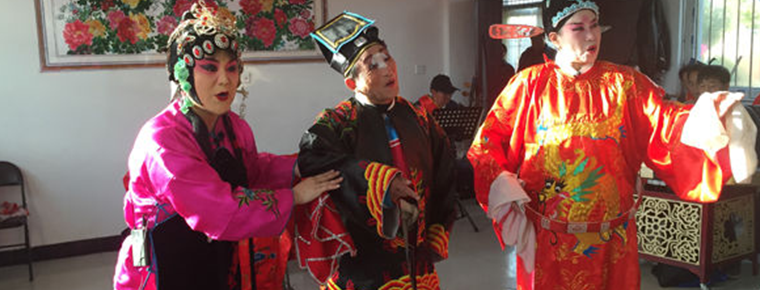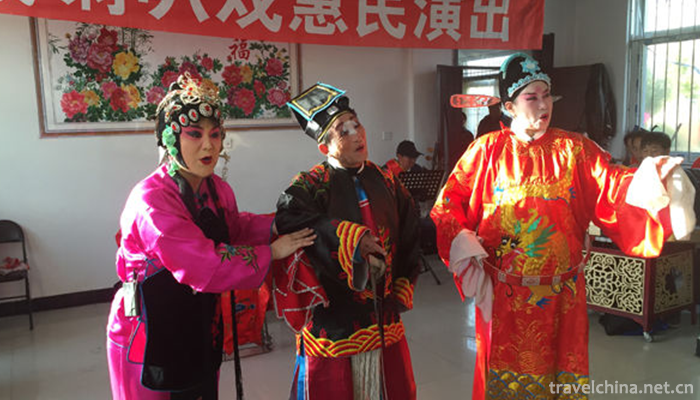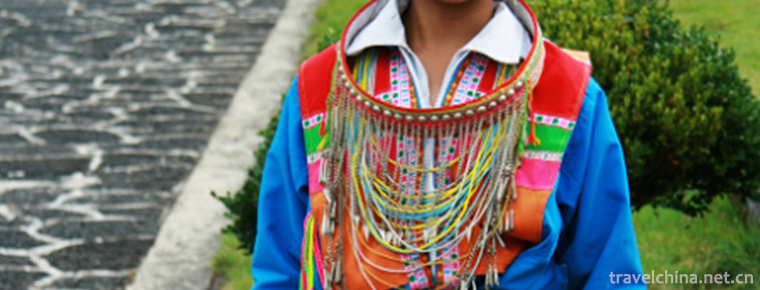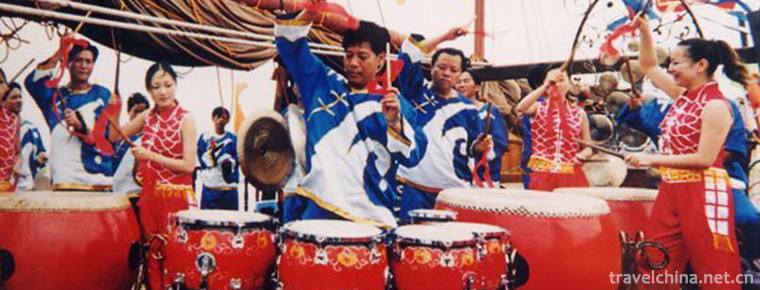2019-06-17

- By ChinaWiki.net
- Chinese Edition
- 2019-05-02
Haicheng Hornplay
Haicheng trumpet opera, the local traditional drama of Anshan City, Liaoning Province, is one of the national intangible cultural heritage.
Haicheng trumpet opera is a kind of traditional local small drama widely spread in Haicheng area of Liaoning Province. The early folk artists, limited by conditions, wore only a round felt hat, a big blouse and a belt to play various characters in the play, so they were also called "big blouse" drama. Because its main accompaniment instrument is Suona, the local popular name of Suona is "trumpet", so it is called "trumpet opera". Haicheng trumpet opera is based on local folk songs. It absorbs foreign tunes such as Yiyang Tune in Jiangxi Province and Liuqiang Tune in Shandong Province, and incorporates them into a mixed system of folk trumpet opera tunes. Its music melody is cheerful and beautiful, fresh and smooth, ups and downs, high-explosive, rhythmic, suitable for singing and dancing.
On June 7, 2008, Haicheng Hornplay was approved by the State Council of the People's Republic of China to be included in the second batch of national intangible cultural heritage lists. The heritage number is IV-100.
historical origin
The trumpet opera originated from Yangge in Haichengdi. Its mother body was mainly introduced into the folk opera of Haicheng Niuzhuang with merchants, which was called Shanxi Liuqiang. In the early Qing Dynasty, there appeared special programs in Haichengdi Yangko, such as "Separation of Two Little Populations", "Lifting Water with Two Small Populations", "Top Lights", "Mum's Muddleheaded" and so on, with folk tunes as the singing voice and some story plots. The characters were once played by one ugly person, and had the prototype of "Two Little Opera", called "Qing Xiaoju Opera". At that time, Haicheng Niuzhuang was the main commercial port in southern Liaoning Province. Businessmen from North China and East China came one after another. Guild halls in Shanxi, Hebei, Yan, Qing and Yang were established one after another. Most of the stores under the guild hall's jurisdiction are from their home towns. Every New Year's Day, they organize concerts, and Tang Huo sings folk operas in his hometown. Over time, these small plays were introduced into the local folk Yangko cooperative fire in Niuzhuang businessmen, mainly Shanxi people, they almost monopolized the local money, wine and sauce gardens and other industries, the largest scale of the concert. Most of the operas flowing into the Yangko Team, such as "Wang Po scolds chickens", "Zhao Kuangxu beats dates", "Feng Xie sells his wife", "Red Moon E Dreams" and so on, come from Shanxi Concert, so they are called Shanxi Liuqiang Trumpet Play by Yangko artists. After several generations of performances by artists, the Liuqiang trumpet opera was the main body and merged with the folk operas introduced from Shandong and Hebei. During the reign of Qianlong and Jiaqing in the Qing Dynasty, the trumpet opera had been combined with local languages, customs, folk songs and Yangko cards. Its singing structure had developed from one or two operas to a combination of many operas. These operas were combined with Yangko. As a result, the dancing elements in the trumpet play are increasing day by day, and a unique style has been formed initially. Because of its origin in folk operas, the form of performance is simple and flexible, with great randomness, and can be improvised according to the situation. In addition, there is a similar form of mime performance, that is, in a play, the lines are very few, the content is explained by action, such as "Zhang Sancai Hui" and "Tie Bow Margin". Shortly after, a group of actors with high artistic level, such as Qian Yunqing, emerged one after another. Hornplay has become a popular local opera. With the commercial exchanges, the range of artists'activities has been expanding. From Xiuyan to Andong in the east, Yingkou in the south, Dalian in the west, Heishan and Jinzhou in the west, and Fushun and Tieling in the north, trumpet plays have been performed in the Yangko Festival.
During the reign of Tongzhi and Guangxu in Qing Dynasty, Haicheng stilt Yangko was prevalent. The trumpet opera was also performed by the local Yangko troupe at stilt fairs. Qigong, handkerchief and fan Gong were cleverly blended into the performance, and a combination of stilt and drama was formed. Due to the improvement of artists'performing skills, semi-professional class clubs are constantly appearing, with a small number of more than ten people and more than twenty people. Most of the actors come from the countryside. The way of teaching art is mainly led by teachers and apprentices. In the first month, they perform on stilts during the day, singing lanterns and bowls at night, and going out to perform in their leisure time. At that time, there were many recreational activities in the countryside, such as "jumping in the first month, making a noise in February, singing in March, rushing to April, leaving Lala to May". There were also the Yingshen Competition, the Chaoshan Vow for Rain, the Yulan Festival and so on. The performance of trumpet opera was very prosperous. However, due to the limitations of staggered performance, performance time and venue, trumpet plays often only sing the dancing part of the original play when staggered performance. Over time, a large number of traditional plays in trumpet plays have been lost. In the middle of Guangxu, jumping flourished in Haicheng. Some trumpet performers joined the trampoline club to sing trumpet plays. Shortly after, the rise of theatrical criticism, and some artists to set up a theatrical evaluation troupe to go out to perform, so that the development of trumpet opera itself is in a stagnant state. Only some trumpet performers perform a few plays with stilts during festivals and celebrations. Their activities are limited to Haicheng, Yingkou and nearby towns. By 1945, the trumpet opera had declined.
After 1949, cultural activities in Haicheng became more and more prosperous, and amateur troupes of trumpet theatre were set up in most townships. At that time, the main theme of the program was celebrating liberation, land reform, repression of counter-revolutionaries and propaganda of marriage law.
After the 1950s, a group of new writers and artists participated in the creation of trumpet plays. They successively compiled more than 30 modern dramas, such as Family Meeting, Kua Dai-in-law, Argument Board and Borrowing Donkey. Most of these plays focus on rural life and retain the lively and simple folk opera style.
In 1953, Gao Dezhen's "Wang Po Curses Chicken" won the script prize in Liaodong Folk Art Festival performance, and Gao Dezhen won the first prize in performance, which was recorded and broadcast on provincial, municipal and county radio stations. Since then, a group of new writers and artists, such as Anbo, Ren Guangwei of Northeast People's Art Theatre and Wang Tiefu of Liaodong Literature and Art Workers Federation, have begun to interview, investigate, excavate and organize the trumpet play. The traditional operas such as Wang Po scolding chicken, Liang Saijin Rolling Face, Zhao Kuangxu Dazao and some other music and singing tunes were published in literary and art magazines of provinces, cities and counties successively, and a critical introductory article such as Haicheng Trumpet Opera, written by Ren Guangwei, was also published in literary and art magazines and newspapers one after another.
In 1980, Haicheng County set up a professional Haicheng Horn Theatre Troupe. However, due to the restrictions of personnel and economic conditions, it will be dissolved at the end of the year. By 1982, there were 10 amateur theatre troupes in Haicheng County. Among them, Niuzhuang, Balizhuang Nantai and other amateur theatre troupes were able to perform regularly, and a number of young actors were trained. Under the guidance of the old artists, they constantly borrowed and absorbed new means of performance to enrich the expressive force of Haicheng trumpet theatre. Nantai amateur theatre troupe rehearsed "Borrowing Donkeys" and "Liang Saijin Rolling Face" and other operas, and many times participated in provincial, municipal and county performance and won awards, and its experience in organizing troupes was promoted to the whole province.
Inheritance and protection
Inheritance value
Haicheng trumpet opera reflects the life of the vast countryside and peasants in southern Liaoning, especially in Haicheng area, and reflects the production and living customs of the working people, so it is close to life. Trumpet opera is not only a kind of opera art, but also a condensed history of regional development and a record of people's entertainment state in an era, engraving details of people's lives. Old artists'memories of stilts and trumpet shows are the life and social history of the people, and a supplement to the great historical regret of taking political history as the main body.
Inheritance status
Haicheng trumpet opera has a small number of existing artists, and they are all too old and rare, and there are few successors. Its traditional repertoire is gradually losing and facing endangered dilemma.
Inheriting characters
Zhao Younian, male, born on April 17, 1929, was selected as the representative successor of the third batch of national intangible cultural heritage projects in June, 2009, and declared in Anshan City, Liaoning Province.
Xiao Jie, female, Han nationality, in May 2018, was selected as the representative successor of the fifth batch of national intangible cultural heritage projects, which was declared by Anshan City, Liaoning Province.
protective measures
In 2005, Anshan Opera Theatre set up a professional Haicheng Trumpet Theatre Troupe. In July 2009, Anshan Cultural Bureau formally established the troupe as a heritage base of Haicheng Trumpet Theatre. In 2006, Haicheng Culture and Sports Bureau approved the establishment of the Haicheng Culture Museum Trumpet Opera Experimental Troupe. In addition, Niuzhuang Town Amateur Performance Team, Tengquan Town Amateur Performance Team, Gengzhuang Amateur Performance Team and Bali Amateur Performance Team are also active trumpet performance groups in Haicheng. They belong to the leaders and organize performances of local township cultural stations. They rehearsed traditional and modern Haicheng trumpet dramas such as "Wang Po scolds chickens", "Competition Board", "On the Road to the Market", "Qiao Gift", etc. The inheritance and development of drama has made contributions.
social influence
Important performance
In June 2006, Haicheng Layi Opera performed on the first "Cultural Heritage Day" held in Anshan City.
In July 2017, the provincial tour of Haicheng Hornplay opened in Liaoning Grand Theater.
Honorary commendation
In 2006, the trumpet play "The Old General Marches" created by the Cultural Museum for Haicheng Population and Family Planning Bureau won the gold medal in the first Population and Culture Festival of Liaoning Province.
In November 2012, the newly compiled Haicheng trumpet opera sketch "Looking for the Bad Species" participated in the Ninth Northeast Three Provinces Drama Sketch Competition in Daqing City, Heilongjiang Province, and won several awards for excellent dramas, writers, composers, directors and performers.

Ask a Question
Your email address will not be published.



0 Questions